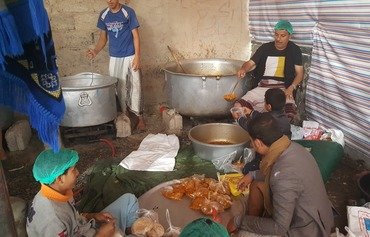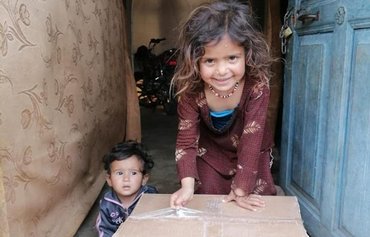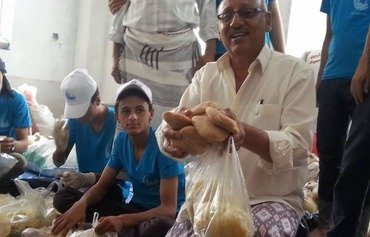Sanaa resident Luwaine Iskandar has embarked on a charitable initiative to help the poor, the needy and those who have been displaced by Yemen's war, enlisting help in this endeavor from the women in her apartment building.
Iskandar and her female relatives have been providing meals to displaced families in her neighbourhood, she told Al-Mashareq, adding that she has been on a mission to spread the word to local women to encourage them to help.
"We have a social responsibility towards our neighbours, the poor and needy and internally displaced persons (IDPs) who live in our neighbourhood," she said, addressing women in her apartment building.
Iskandar said she started her humanitarian mission with her family, encouraging her female relatives to help ease the suffering of the poor and needy in their midst.
"I was surprised to see a positive response from women and young people, which prompted me to look beyond and provide ready meals for the needy and displaced in our neighbourhood," she said.
Working with partners and donors, the women have so far fed 100 families and a total of 550 individuals in the city's Saawan neighbourhood, she said.
"The success of the initiative encouraged other women in other neighbourhoods to follow suit and provide for poor and needy people," Iskaner said.
Encouraging charity and kindness
Meanwhile, stay-at-home mother Shujoun Mohammed is urging people to look after their neighbours in an effort to encourage the charity and kindness for which Yemeni society is known.
"I have taken advantage of all social events where women gather, such as weddings and funerals, to encourage women to ask about their neighbours and to look for those in need, particularly IDPs," she told Al-Mashareq.
Mohammed said she has seen a hugely positive response to her initiative, especially after public sector wages were frozen , which caused many families to experience hardship.
Some were forced to beg on the streets, she said, "while others closed their doors, painting a sad picture of their suffering from hunger".
"Charity and compassion are two distinct Yemeni traits," Mohammed noted.
On a personal level, she said, she and other women in her apartment building hand out meals to needy families in the 45 neighbourhood in al-Safia district as part of an initiative called "Look After Your Neighbour".
This initiative and others like it are vital to easing people's economic burden, she said, "specifically through providing food in light of the ongoing war".
The war has brought commerce and industry to a halt and has increased unemployment , she said, in addition to causing public sector workers to lose out on their monthly income.
Meals for school children
"The idea of providing meals for people in need is excellent and has directly reached its targeted recipients," said Wujooh Institute for Media and Development head Mansour al-Jaradi.
"Local residents and humanitarian workers can identify needy families, particularly those that have been displaced," he told Al-Mashareq.
"No doubt, such initiatives foster a spirit of charity and ease people’s suffering, especially since we noticed that some students are coming to school without breakfast or dinner the night before," he said.
There also have been instances where students fainted during assembly due to hunger, he added, noting that some clearly suffer from malnutrition.
The institute, through its "Tender Hearts" initiative, has made it easier to reach recipients in every neighbourhood via local volunteers, he said.
Volunteers helped to identify IDPs and the poorest people in their neighbourhoods and schools so they could receive breakfast meals in addition to providing both lunches and dinners, he said.
The institute also distributed 100 food baskets to the neediest and most vulnerable among the displaced population in Sanaa at the start of November.
Looking forward, al-Jaradi said, the institute is conducting a ground survey in certain areas to identify people in need and IDPs who would need blankets to help them tolerate the cold winter months.
In the Sanaa administrative district, he said, 46,000 blankets have been distributed, with more to come for people in provinces where temperatures are expected to plunge.
War exacerbates suffering
In late October, the UN food agency warned of alarming levels of hunger in Yemen, which already had one of the world's highest levels of malnutrition before the war.
According to the UN children's agency, 1.5 million children suffer from malnutrition, including 370,000 for whom it is so severe it weakens their immune system.
Earlier this month, the World Food Programme's Yemen director Torben Due warned "an entire generation could be crippled by hunger", AFP reported.
The World Health Organization also has warned that "shortages of food, medicine, and other basic commodities are... placing millions more people on the brink of starvation ".
The public sector salary stoppage has brought about a humanitarian crisis because a large segment of Yemeni society lives from month to month on their wages, economist Abdul Jalil Hassan told Al-Mashareq.
"People’s suffering has doubled, as they have become helpless," he said.
Scarcity of temporary jobs has forced many to cut down on their daily meals, he said, adding that the stoppage in salaries coincided with the start of the school year with its many demands, as well as the onset of winter.
"Many children have to go to school while unable to tolerate the cold mornings and without breakfast that would help them face the cold and help with their learning," he said.

![A Yemeni woman volunteer cooks food for the needy in her neighbourhood through the 'Tender Hearts' initiative. [Photo courtesy of Mansour al-Jaradi]](/cnmi_am/images/2016/11/29/6654-Yemen-volunteer-food-600_384.jpg)






